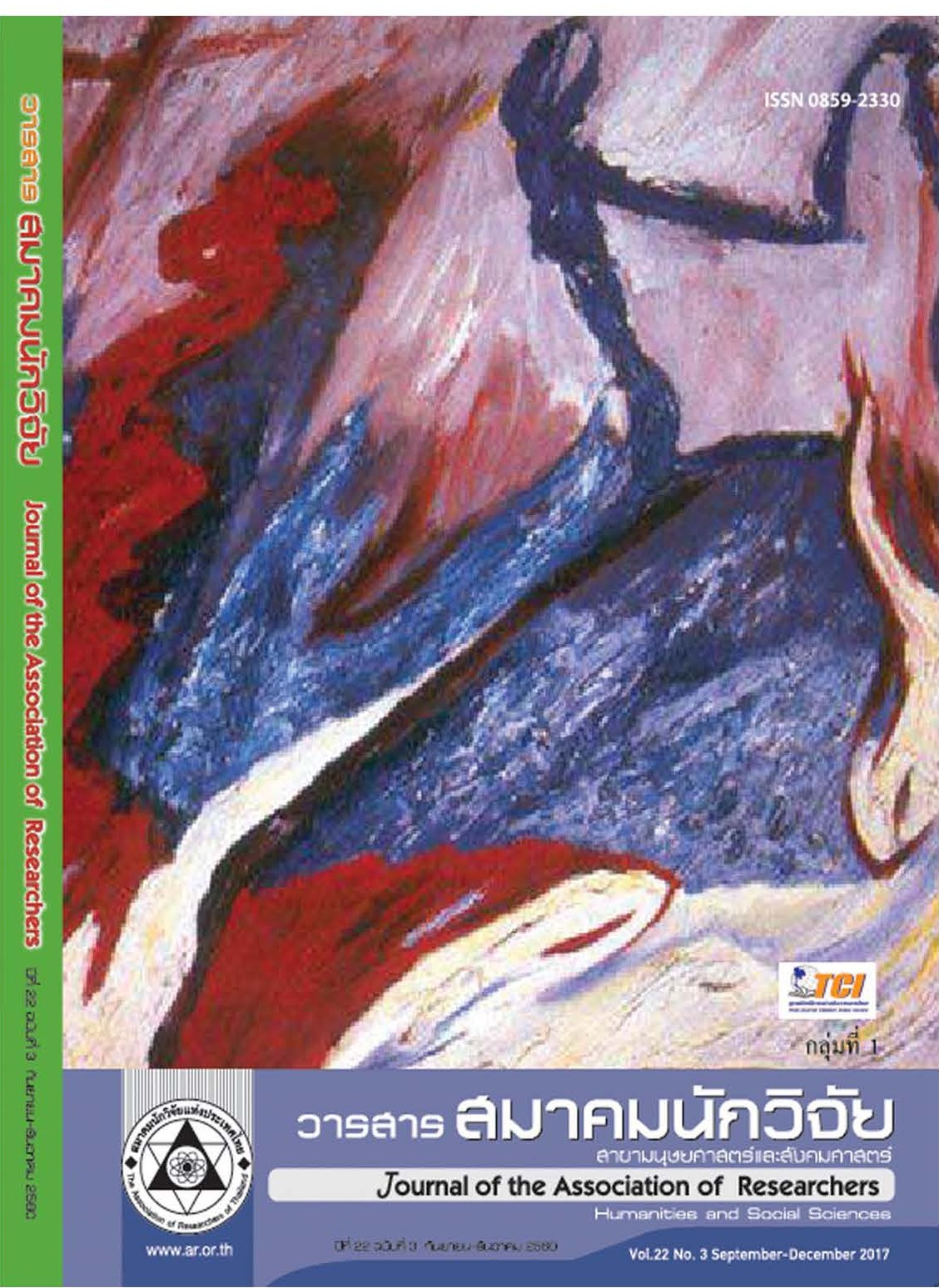Guidelines for Development of Tourism Professionals According to the ASEAN Mutual Recognition Arrangement on Tourism Professionals (MRA on TP)
Main Article Content
Abstract
This study is qualitative research whose data was collected by in-depth interviews, observation, and focus group discussion with people who play an important role in the implementation of the ASEAN Mutual Recognition Arrangement on Tourism Professionals (MRA on TP) which includes Singapore, Indonesia, Cambodia, Laos, and Vietnam. This research aims to study and analyses good guidelines in the implementation of MRA on TP and suggest guidelines for the development of Thailand's tourism professionals.
The result of the research found that guidelines which are considered as good ones include 6 factors: (1) developing tourism professionals by market force (2) strengthening their own standard of professional development (3) close co-operation between the tourism industry and educational institutes (4) determine types of institutes that focus on professional development (5) legislate a law to support bringing the professional development to the competency system (6) improving tourism professionals with communicative English and propose to 4 significant organizations: (1) tourism associations (2) educational institutes or skill development institutes (3) government agencies and (4) tourism professionals. To achieve this, integrative implementation is needed in order to propel the development of tourism professionals in Thai land to the acceptable standard. As a result, they will be able to do the free flow of skilled labor in ASEAN efficiently.
Article Details
บทความที่ปรากฏในวารสารนี้ เป็นความรับผิดชอบของผู้เขียน ซึ่งสมาคมนักวิจัยไม่จำเป็นต้องเห็นด้วยเสมอไป การนำเสนอผลงานวิจัยและบทความในวารสารนี้ไปเผยแพร่สามารถกระทำได้ โดยระบุแหล่งอ้างอิงจาก "วารสารสมาคมนักวิจัย"
References
จิตติรัตน์ แสงเลิศอุทัย. (2558), เครื่องมือที่ใช้ในการวิจัย วารสารบัณฑิตศึกษา ปีที่ 12 ฉบับที่ 58 กรกฎาคม-กันยายน 2558. หน้า 17. ศูนย์บริการวิชาการแห่งจุฬาลงกรณ์มหาวิทยาลัย, มปป. โครงการเตรียมการรองรับการเคลื่อนย้ายของแรงงานสู่การเป็นประชาคมอาเซียน. รายงานการศึกษาฉบับสมบูรณ์ หน้า 8-1 ถึงหน้า 2-26.
วรรณดี สุทธิ์นรากร. (2550). การวิจัยเชิงคุณภาพ : การวิจัยในกระบวนทัศน์ทางเลือก, กรุงเทพฯ : สยามปริทัศน์
ศิริพงศ์ รักใหม่. (2559). การเปรียบเทียบหลักสูตรระหว่างหลักสูตรบริหารธุรกิจบัณฑิตของวิทยาลัยดุสิตธานี กัป/ตรฐานสมรรถนะอาเซียน, วารสารวิทยาลัยดุสิตธานี ปีที่ 10 ฉบับที่ 1 เดือนมกราคม-มิถุนายน 2559 หน้า 162.
สถาบันพัฒนาบุคลากรการท่องเที่ยว สํานักปลัดกระทรวงการท่องเที่ยว. (2554), มาตรฐานสมรรถนะร่วมวิชาชีพสําหรับการท่องเที่ยวอาเซียน, เล่มรายงาน. หน้า644
สถาบันพัฒนาบุคลากรการท่องเที่ยว สํานักปลัดกระทรวงการท่องเที่ยวและกีฬา. (2557) โครงการเครือข่ายความร่วมมือหลักสูตรอาเซียนด้านการท่องเที่ยว. รายงานการศึกษาฉบับสมบูรณ์ หน้า 1-85.
สถาบันพัฒนาบุคลากรการท่องเที่ยว สํานักปลัดกระทรวงการท่องเที่ยวและกีฬา. (2558) โครงการเครือข่ายความร่วมมือหลักสตรอาเซียนด้านการท่องเที่ยว ระยะที่ 2. รายงานการศึกษาฉบับสมบูรณ์ หน้า 117.
สุภางค์ จันทวานิช. (2552). การวิเคราะห์ข้อมูลในการวิจัยเชิงคุณภาพ. กรุงเทพมหานคร : สํานักพิมพ์แห่งจุฬาลงกรณ์ มหาวิทยาลัย
Academic Service Center, Chulalongkorn University. Preparation for Flow of Labor in the ASEAN Community. Final Report. p. 8-1 to 8-26. (in Thai).
Alan Hickman and Jim Irwin. (2013). Gap Analysis on implementation of MRA on Tourism Professionals.Asian Australia Development Cooperation Program Phase II. Final Report. p. 1-58. Web site: http://aadcp2.org/file/ASEAN-GA-Final-Report.pdf.
Asean Secretariat. (2015). Success Stories and Best Practices from Cambodia and Indonesia. A joint ASEAN Australia Development Cooperation Program Phase II and ASEAN Secretariat Study. Web site: http://aadcp2.org/wp-content/uploads/FS-Success-Stories-Tourism.pdf.
Association of Southeast Asain Nation. (2013). Handbook of ASEAN MRA on Tourism Professionals. ASEAN Tourism Documents. Web site: http://www.aseantourism.travel/documents/asean-tourismdocuments.
Creswell, John W. (2013). Qualitative Inquiry and Research Design: Choosing among Five Approaches. Los Angeles: SAGE Publication, Inc.p. 183.
Department of ASEAN Affairs. Ministry of Foreign Affairs. (2015). Bali Concord // 2003. ASEAN Documents.Retrieved December 10, 2015, Web site: http://www.mfa.go.th/asean/th/other/2397. (in Thai)
Institute for Tourism Personnel Training. Ministry of Tourism and Sports. (2011). ASEAN Common Competency Standards for Tourism Professionals. Report. p. 6-44. (in Thai).
Institute for Tourism Personnel Training. Ministry of Tourism and Sports. (2014). Cooperation Network ASEAN Tourism Professionals Project. Final Report. p. 1-85. (in Thai).
Institute for Tourism Personnel Training. Ministry of Tourism and Sports. (2015). Cooperation Network ASEAN Tourism Professionals Project. Final Report. p. 1-17. (in Thai).
Jittirat Saengloetuthai. (2015). Research Instrument. Journal of the Graduate Studies Vol. 12 No. 58 July - September 2015. p. 17. (in Thai)
Parry, B. Scott. (1997). Evaluating the impact of Training. New York: John and Willey. Siripong Rugmai. (2016). The Curriculum Comparisonsbetween Bachelor of Business Administration Programs of Dusit Thani College and The ASEAN Competency Standards. Journal of Dusit Thani College, Vol. 10, No. 1 January-June 2016. p. 162. (in Thai).
Supang Chantavanich. (2009). Data analysis in qualitative research. Bangkok: Chulalongkorn University. (in Thai).
Wandee Suttinarakorn. (2016). Qualitative research: Research of alternative paradigm. Bangkok: Siamparithas Publishing. (in Thai).
William Angliss Institute. (2015). ASEAN-Australia Development Cooperation Program Phase II. Retrieved December 26, 2015. Web site: http://www.waseantourism.com.


